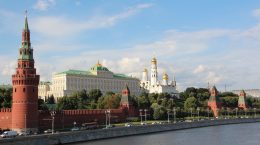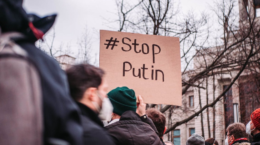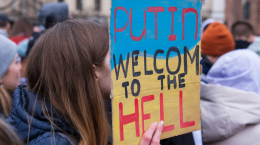Recently, Russia’s possible military invasion of Ukraine has been one of the most discussed in many world media. The situation looks tense. The security services of many countries have announced the highest build-up of troops near the borders with Ukraine since the Second World War. The “Yabloko” party announced the collection of signatures against Putin’s war. The text of the petition published on the party’s website can be signed by persons located on the territory of the Russian Federation.
It seemed strange to the European man in the street that Russian citizens tacitly accepted their president’s measures. There was not a single mass rally against a possible war with neighbours. Small actions devoted to the peace were organized by civil activists and initiative groups and did not have mass support from the people.
The Kremlin, through pro-government propaganda, has kept the topic of Ukraine on the information agenda for a long time, giving negative comments to everything that happens there, trying to arouse hatred towards Ukrainians and shift the attention of the population from internal real problems to imaginary external ones.
Ukraine automatically became an enemy for Russia after it lost influence on it, annexed Crimea and unleashed a war there. Moreover, she did it contrary to the existing Treaty of Friendship, Cooperation and Partnership signed by President of Ukraine Leonid Kuchma and President of Russia Boris Yeltsin on May 31, 1997. The Heads of State consolidated the principle of strategic partnership between their countries, recognized the inviolability of existing borders, respect for territorial integrity and mutual obligations not to use their territory to the detriment of each other’s security. The Verkhovna Rada ratified the treaty on January 14, 1998, the State Duma – on December 25, 1998. The exchange of instruments of ratification of the Treaty took place in Moscow on April 1, 1999, from that day it entered into force.
- According to the treaty, both countries fully guaranteed citizens’ rights and freedoms, except the cases established by the national legislation of the States or their international treaties. The treaty obliged each country to protect the rights of their citizens living on the territory of another country.
By the way, Ukraine, being a CIS member state since 1991, did not sign its Commonwealth Charter after the ratification of the Agreement by the Verkhovna Rada, thus not becoming a member of it but remaining a founding state. After the annexation of Crimea to Russia on March 19, 2014, the National Security and Defense Council of Ukraine decided to terminate Ukraine’s chairmanship in the CIS. The Secretary of the National Security and Defense Council of Ukraine, A. Turchinov, said that the country had begun the process of completely ending its participation in the structures of the Commonwealth of Independent States.
On September 3, 2014, the CIS Executive Secretary S. Lebedev stated that Ukraine had not seceded from the CIS. On December 8, deputies of the Verkhovna Rada began discussing the relevant issue. On November 9, 2016, a bill on Ukraine’s withdrawal from the CIS was submitted to the Verkhovna Rada. In March 2018, the President of Ukraine, P. Poroshenko, proposed to prepare, together with the Cabinet of Ministers, a document on the official termination of participation in the CIS and the final closure of the Ukrainian representative office at the relevant institutions in Minsk.
- He explained his decision by the European orientation of the country, “at the same time, the entire legal framework concluded by Ukraine within the CIS should be inventoried for compliance with national interests.”
On May 19, 2018, Poroshenko signed a decree that put into effect the decision of the NSDC on the final termination of Ukraine’s participation in the statutory bodies of the CIS. NSDC instructed the Foreign Ministry to take measures to terminate certain interstate agreements. On August 28, 2018, Ukraine closed its representative office at the CIS statutory bodies. Nevertheless, the CIS Executive Committee sent an invitation to the new President of Ukraine, Volodymyr Zelensky, to the CIS summit on October 11, 2019, but Zelensky did not go to it. In the same year, the IMF included Ukraine in the group of developing European countries, removing the country from the list of the CIS group, in which it was previously listed.
In 2020, President Volodymyr Zelensky signed a decree withdrawing from the agreement on the establishment of the Council of Heads of Financial Intelligence Units of the CIS member states.
Nevertheless, all this time, the executive bodies of the Commonwealth continue to send Ukraine working documentation and invitations to meetings at which its national flag is present and a seat at the table is reserved for the delegation. As of December 2021, the CIS considers Ukraine as a member. The Ukrainian authorities did not send an official notification of withdrawal from the organization.
The Treaty on Friendship, Cooperation and Partnership between the Russian Federation and Ukraine obliged them to take the necessary measures on their territory. They must include the adoption of appropriate legislative acts, to prevent and suppress any actions that constitute an incitement to violence or violence based on national, racial, ethnic or religious intolerance.
Ukraine and Russia have agreed to cooperate with the UN and other international organizations, including economic and financial ones, to support each other in joining international organizations and joining agreements and conventions to which one of the countries is not a party. Both sides pledged to respect each other’s territorial integrity and confirmed the inviolability of the existing borders between them.
- According to Article 40 of the Agreement, it was concluded for ten years, and its validity was automatically extended for subsequent ten-year periods. To terminate the contract, it was necessary to submit a corresponding application by one of the countries at least six months before the end of the next ten-year period. Following this article, in October 2008, the contract was automatically extended for the next ten years – until April 1, 2019.
In 2014, the annexation of Crimea to the Russian Federation was carried out, in connection with which the Ukrainian authorities accused Russia of violating the provisions of the treaty. Both Ukrainian and Russian politicians put forward proposals to terminate the agreement; however, none of the countries was in a hurry to break the agreement. The Russian Federation believed that its potential withdrawal from the treaty would not “contribute to solving the problems of Russian-Ukrainian relations.” The Ukrainian authorities intended to use the formal continuation of the agreement to hold Russia accountable for the violation of the document.
In March 2018, the Ministry of Foreign Affairs of Ukraine proposed to denounce the friendship agreement with Russia. On August 28, President of Ukraine Petro Poroshenko instructed the Foreign Ministry to prepare for the termination of the agreement. On September 6, the National Security and Defense Council of Ukraine decided to terminate the treaty under the provisions of its article 40. On September 17, the President approved this decision. On September 24, the official note was handed over to the Russian Foreign Ministry.
On December 3, 2018, the draft law on the agreement termination from April 1, 2019, was submitted by the President of Ukraine to the Verkhovna Rada as urgent. The document provides that “the termination releases Ukraine from any obligation to fulfil it and does not affect the rights, obligations or legal status of Ukraine that arose as a result of the implementation of the said Agreement before its termination, under article 70 of the Vienna Convention on the Law of Treaties.”
On December 6, 2018, the Verkhovna Rada of Ukraine approved a bill on the termination of the treaty of friendship with Russia from April 1, 2019. On December 10, 2018, President of Ukraine Petro Poroshenko signed the law “On termination of the Treaty of Friendship, Cooperation and Partnership between Ukraine and the Russian Federation”.
On April 1, 2019, the agreement officially terminated.
It is a brief history of the diplomatic confrontation between our neighbouring countries. Ukraine is trying to break away from the Soviet system of governance and raise the index of democracy. Russia tries to impose a subordination policy and follows the path of strengthening authoritarianism.
“Our House” hopes that common sense and universal values will prevail over the Kremlin’s maniacal desire to divide and rule. To date, there is a report that Russian troops have begun to return from exercises to their places of deployment, but the information appears in many sources that at least part of the troops and ammunition will remain on the territory of Belarus. How will events develop? “Our House” is closely monitoring the situation.







